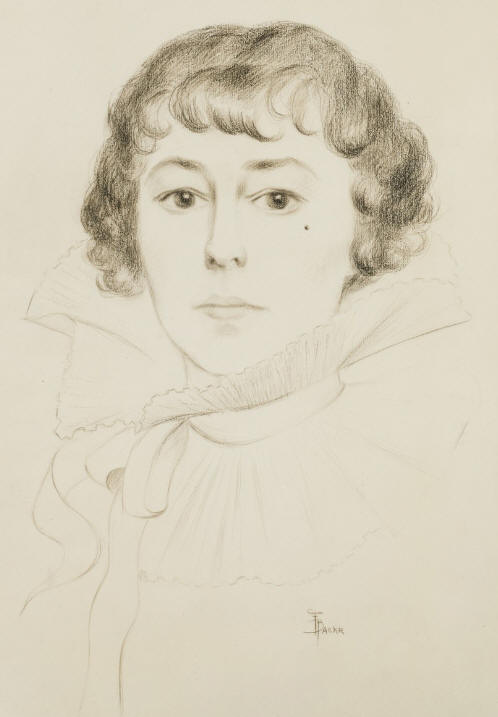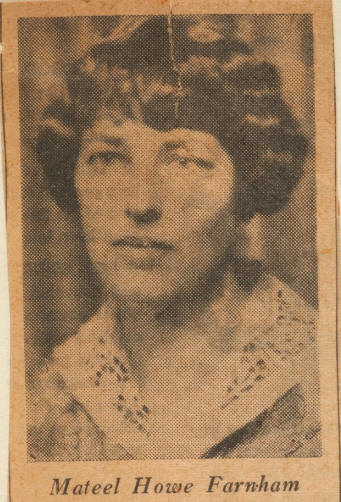

Queer Places:
400 Compo Rd S, Westport, CT 06880
 Mateel Howe Farnham (1883 - May 2, 1957)
was the daughter of editor, philosopher and novelist Edgar W. (Ed) Howe, and
was named after a character in her
father's most famous novel, The Story of a Country Town (1883). She was
a member of the Heterodoxy Club.
Mateel Howe Farnham (1883 - May 2, 1957)
was the daughter of editor, philosopher and novelist Edgar W. (Ed) Howe, and
was named after a character in her
father's most famous novel, The Story of a Country Town (1883). She was
a member of the Heterodoxy Club.
Mateel Howe Farnham wrote a number of popular novels herself. His father printed her early writing in his Atchinson, Kansas, Daily Globe. At the age of 19, Farnham won a $500 prize from The Portland Oregonian for the best essay on the city of Portland.
Little is known about her education, except that she attended Mount Vernon Seminary in Washington, D.C. She married an economist and industrial engineer, Dwight T. Farnham, who wrote three humorous autobiographical books about their country home and garden.


Her first novel, Rebellion, published rather late in life, won a $10,000 prize from Dodd, Mead and Co., book publishers. Of her novels, the three set in the Midwest are her best work. Rebellion (1927), her prize-winning first novel, has an interesting background and the fascination of autobiographical revelations. Dedicated to her mother, "whom I have never known to do a selfish or an unkind thing," the novel clearly exposes some of the tensions and morbidity of the Howe family life. Like Howe, the father in the novel is a depressed and bitter man who takes out his unhappiness on his family. While the family sketched in this book, the Burrells, does not parallel the Howe family in many outward circumstances, the central conflict of the story also pits the strong-minded girl Jacqueline against her domineering father. Set in New Concord, Kansas, the novel champions the right of the daughter to live her own life—go to college, get a job, and marry the man of her choice. Her vain, egotistical father would like her to be a Southern belle. After many conflicts, she marries suitably, despite her father's abnormal jealousy, and gets her inheritance by blackmailing him. In reality, her father disinherited her, leaving her only $1 out of a $200.000 inheritance.
Farnham's two other Midwest novels, Lost Laughter (1933) and Great Riches (1934), both focus on the rise of young men in country towns, with a suitable complement of domineering parents and scheming women.
Farnham's work is shot through with gothic elements—family secrets, letters withheld from dependents, and rich, eccentric visitors—in the same way that her father's work is. Her novels also share with her father's a tendency to preach, as is most evident in Ex-Love (1937), an exposé of the "alimony racket." Here, a greedy and jealous woman gratuitously divorces her loving husband and then holds him to a large alimony settlement, although she is wealthy herself and he has been ruined by the Depression. Again, blackmail saves the day, but does not save the hero from a stint in jail and the loss of his new wife's child.
Three other novels are set in the Susquehanna valley. Marsh-Fire (1928) is the story of another scheming woman, who gets ahead in business by abject flattery of males. Wild Beauty (1930), made into a movie (Wayward) in 1932 by Paramount, is another tale of domineering parents and children seeking their own lives. Farnham's last novel, The Tollivers (1944), mixes social comedy with eccentric characters.
These novels by Farnham are not very well written, and perhaps most of their interest lies in their autobiographical elements. In their depiction of marriage, small-town society, and business adventures, they are fairly typical of their times.
In addition to authoring 8 novels, Farnham contibuted short stories to The Delineator, Women's Home Companion and other magazines and a novelette to The Ladies' Home Journal. She was a member of the Heterodoxy club, a feminist debating group in Greenwich Village, New York City. The membership also included bisexual and lesbian women, in addition to heterosexuals.
My published books: